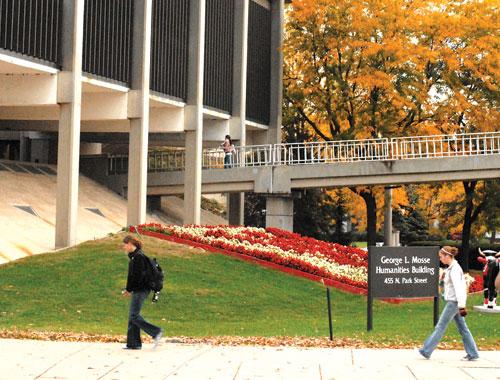After the financial crisis of 2007-08, national leaders have increasingly regarded career outcomes as the primary goal of higher education, causing an uptick in enrollment in science, technology, engineering and mathematics fields while leaving humanities education relatively sparse.
University of Wisconsin is not excused from this trend.
According to a report by the office of the registrar, the English major, for instance, has seen numbers decline from 586 students in 2003 to 450 students in fall 2012. The history major, just before the financial collapse of 2007, had 688 students, but has seen numbers fall to 469 in fall 2012. Contrast that with the mechanical engineering major, which saw an increase of 122 students during the same period.
While the public perception of humanities majors varies, many UW scholars and students argue for its importance.
“There is so much emphasis in preparation for specific jobs and the English major looks like it’s not preparing people for careers, when in fact it is,” UW English professor Caroline Levine said. “There has been a pretty successful image out there that if you major in English you won’t be employable afterwards. It’s not true, but people do believe it.”
While scholars argue English majors certainly do have options after graduation, recent surveys given to graduating UW students do strengthen the case that, at least at graduation, those who pursued STEM in undergrad have more solid career outcomes.
In a survey of STEM post-graduation plans for the fall class of 2012 and the spring class of 2013, 65 percent of those surveyed in the physical sciences had already accepted a job. Outcomes were less promising for students in the arts and humanities, with a lower 41 percent having already accepted a position.
While numbers can be helpful in getting a feel for the job market, some argue that focusing completely on careers and job placement as the only reason for a college degree is inaccurate.
“This questioning, thinking and mulling over the past and thinking about alternatives to the present are a really precious value that might go away,” Levine said. “Now when I regularly ask students what college is for, they almost exclusively say preparation for jobs.”
Levine also said her students tell her that science majors often mock them for being English majors, underscoring peer pressure as another factor for students’ flight from those fields.
Jenna Wroblewski, a UW sophomore in Scandinavian studies said studying the humanities denotes a certain freedom of thought that those in other majors don’t always embrace, instead focusing too much on work while forgetting how to live life, she said.
“As humanities students, we have the liberty to think a little more freely because we’re not being told equations and are asked to think critically,” she said. “That can pay off in incalculable ways.”
At UW, the Letters and Science Career Initiative launched a year ago by the school’s dean, John Karl Scholz, looks to define, build upon and spread the word on the applicable job skills that undergraduates in the humanities do learn.
“We really do believe that the liberal arts graduates from UW are successful, but I think that students need to start thinking more strategically and at an earlier time in their undergraduate experience about how to prepare for the world of work,” Rebekah Prior Pare, associate dean and director of the L&S Career Initiative, said.














